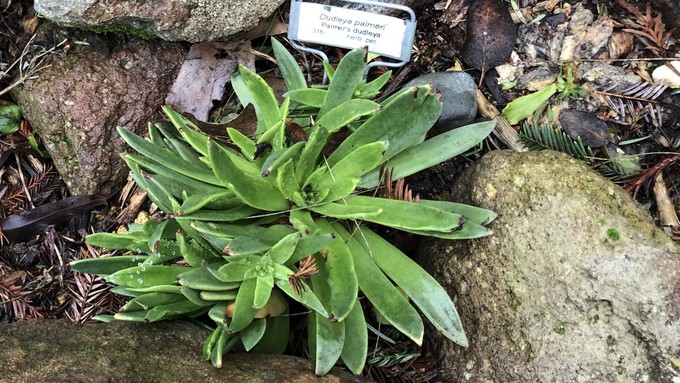
El Dorado County master gardeners present free workshop

Palmer's dudleya is an example of a California native succulent that would do well in a small garden or in a container. Kathy Morrison
Interested in native plants but think you don’t have enough space? Meet some compact California natives that thrive in smaller spaces or containers during a free workshop, “There's a Native Plant for That: Gardening with Native Plants.”
Set for 9 a.m. Saturday, Sept. 7, this three-hour workshop will be held at Blackstone Community Center in El Dorado Hills and is open to interested gardeners from throughout the region.
Hosted by the UCCE master gardeners of El Dorado County, this class also features the expertise of members of the California Native Plant Society. They’ll cover the basics of native gardening in all spaces, big or small with special emphasis on smaller areas.
“Do you love native plants and wonder how you can enjoy them on your patio or in your smaller garden?” ask the master gardeners. “Join master gardeners and California Native Plant Society (CNPS) members Dolores Morrison, Kathleen Barco, and Ola Jane Gow and discover how to evaluate your yard to establish a native landscape, how to select and maintain plants, how to group plants by water needs, and, if you only have a small space, the best native plants for containers.
“There are native plants for every environment,” they add. “Come and learn with us!”
Registration is requested, though not required for this free class. Find the link here under “Master Gardener Calendar”: https://mgeldorado.ucanr.edu/.
Blackstone Community Center is located at 1461 Blackstone Parkway, El Dorado Hills.
Comments
0 comments have been posted.Sacramento Digs Gardening to your inbox.
Food in My Back Yard Series
April 1: Don't be fooled by these garden myths
March 25: Fertilizer tips: How to 'feed' your vegetables for healthy growth
March 18: Time to give vegetable seedlings some more space
March 11: Ways to win the fight against weeds
March 4: Potatoes from the garden
Feb. 25: Plant a fruit tree now -- for later
Feb. 18: How to squeeze more food into less space
Feb. 11: When to plant? Consider staggering your transplants
Feb. 4: Starting in seed starting
Sites We Like
Garden Checklist for week of March 30
Your garden doesn’t mind April showers. Get busy now to enjoy those future flowers.
* Get ready to swing into action in the vegetable garden. As nights warm up over 50 degrees, start setting out tomato, pepper and eggplant transplants.
* From seed, plant beans, beets, cantaloupes, carrots, corn, cucumbers, melons, pumpkins, radishes and squash. (Soak beet seeds overnight in water for better germination,)
* Plant onion sets.
* In the flower garden, plant seeds for asters, cosmos, celosia, marigolds, salvia, sunflowers and zinnias.
* Transplant petunias, zinnias, geraniums and other summer bloomers.
* Plant perennials and dahlia tubers for summer bloom.
* Transplant lettuce and cabbage seedlings.
* April is the last chance to plant citrus trees such as dwarf orange, lemon and kumquat. These trees also look good in landscaping and provide fresh fruit in winter.
* Smell orange blossoms? Feed citrus trees with a low dose of balanced fertilizer (such as 10-10-10) during bloom to help set fruit. Keep an eye out for ants.
* Apply slow-release fertilizer to the lawn.